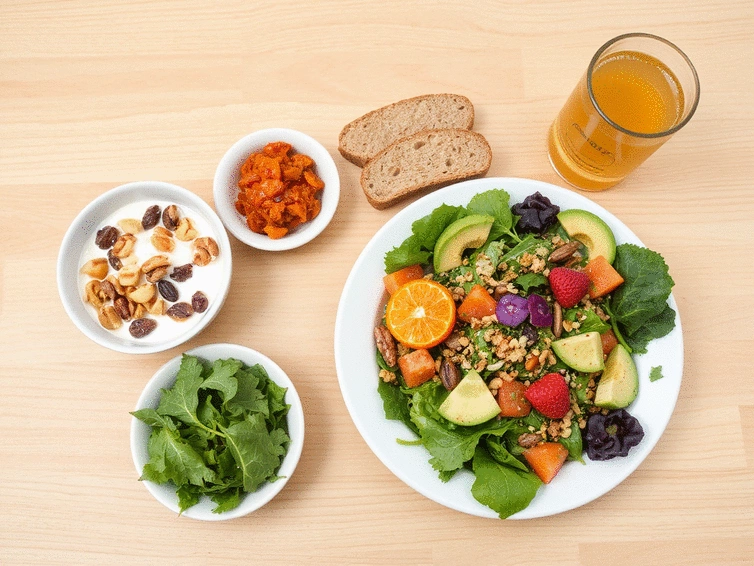
Crafting a Gut-Health Meal Plan
Did you know that about 70% of your immune system resides in your gut? Understanding gut health is not just about digestion; it’s a gateway to overall well-being!
What You Will Learn
- Probiotics and prebiotics play a vital role in maintaining gut health, enhancing digestion, and nutrient absorption.
- A healthy gut can significantly boost your mood and energy levels through the gut-brain axis connection.
- Approximately 70% of your immune system is located in the gut, highlighting its importance in disease prevention.
- Consistency in your meal planning and making mindful dietary choices are key to nurturing gut health over time.
- Monitoring health outcomes and adjusting your diet based on individual responses can lead to optimal gut health.
- Engaging with a community and sharing your journey can provide motivation and enhance your commitment to gut health.
Your Gut Health Journey: A Path to Overall Well-Being
This visual outlines key aspects of gut health, from essential components to its impact on immunity and the journey to a healthier gut.
Key Players in Gut Health
Probiotics: Live beneficial bacteria in fermented foods.
Prebiotics: Fibers that feed good bacteria (e.g., bananas, onions).
Gut's Impact on Overall Well-Being
-
•
Boosts Mood: Influences neurotransmitter production (serotonin).
-
•
Enhances Energy: Optimizes nutrient absorption.
-
•
Weight Management: Regulates metabolism.
Gut-Immune System Connection
~70% of the immune system resides in the gut.
-
•
Probiotics combat harmful bacteria.
-
•
Prebiotics support healthy gut bacteria growth.
-
•
Reduces inflammation.
Journey to Better Gut Health
Consistency: Regular intake of gut-friendly foods.
Monitor: Track symptoms and progress.
Adjust: Modify plan based on individual responses.
Understanding the Importance of Gut Health
When we talk about health, we often think about our weight, our exercise routines, or what’s on our plates. But have you ever considered how crucial your gut health is to your overall well-being? Gut health is the foundation for a lively and energized life! From digestion to immunity, a happy gut plays a significant role in how we feel every day.
At iFit Magazine, we believe that understanding your body is key to making lasting changes. So, let's dive into the wonderful world of gut health and discover how it influences not just your digestion but your overall vitality!
The Role of Probiotics and Prebiotics in Digestive Health
Probiotics and prebiotics are essential players in the health of your gut! Probiotics are live beneficial bacteria that help maintain the natural balance of microorganisms in the intestines, while prebiotics are fibers that feed these good bacteria. Together, they create an ecosystem that supports digestion and absorption of nutrients.
- Probiotics: Found in yogurt, kefir, and fermented foods, they help replenish good bacteria.
- Prebiotics: Foods like bananas, onions, and garlic nourish these beneficial bacteria, promoting their growth.
- Both work hand-in-hand to enhance nutrient absorption, making your meals more effective!
Incorporating both into your diet can lead to improved digestion, reduced bloating, and even better mental clarity! It’s like giving your gut a well-deserved treat.
How Gut Health Affects Overall Well-Being
Did you know that your gut is often referred to as your "second brain"? It’s fascinating how a healthy gut can elevate your mood, enhance your energy levels, and even support your mental health! This connection is due to the gut-brain axis, which communicates between your gut and brain.
- Boosts Mood: A balanced gut microbiome can positively influence neurotransmitter production, such as serotonin.
- Enhances Energy: Nutrient absorption is optimized, leading to better energy levels throughout the day.
- Supports Weight Management: A healthy gut can influence weight through metabolism regulation.
By focusing on gut health, you can unlock a pathway to feeling better both physically and emotionally. It's incredible how a few dietary adjustments can lead to profound changes!
The Connection Between Gut Health and Immune System Function
Your gut health and immune system are closely linked! About 70% of your immune system resides in your gut, making it a critical line of defense against illnesses. When your gut flora is balanced, it helps to strengthen your immune response.
- Probiotics combat harmful bacteria, reducing the risk of infections.
- Prebiotics enhance the growth of healthy gut bacteria, which supports overall immunity.
- A healthy gut can also reduce inflammation, a common issue that affects immunity.
Taking care of your gut is like fortifying your body's defenses, allowing you to better protect yourself from illness. As we explore the benefits of probiotics and prebiotics in the next section, remember that every bite you take is a step towards a stronger, healthier you!
Interactive Poll: Your Gut Health Journey
We want to hear from you! How do you currently prioritize your gut health?
Frequently Asked Questions About Gut Health
Q1: What is gut health and why is it important?
Gut health refers to the balance of microorganisms living in your digestive tract. It's crucial because it impacts digestion, nutrient absorption, mood, energy levels, and up to 70% of your immune system.
Q2: What is the difference between probiotics and prebiotics?
Probiotics are live beneficial bacteria found in fermented foods like yogurt and kefir, which help maintain a healthy gut microbiome. Prebiotics are types of fiber (found in foods like bananas and onions) that feed these good bacteria, promoting their growth and activity.
Q3: How does gut health affect mental well-being?
The gut is often called the "second brain" due to the gut-brain axis, a communication network between your gut and brain. A balanced gut microbiome can positively influence the production of neurotransmitters, such as serotonin, which plays a key role in mood regulation and overall mental health.
Q4: How can I improve my gut health through diet?
To improve your gut health, consistently incorporate foods rich in both probiotics (e.g., fermented foods) and prebiotics (e.g., fiber-rich fruits and vegetables) into your diet. Staying hydrated and mindful meal planning are also crucial.
Q5: When should I consider taking gut health supplements?
While it's best to get nutrients from food, probiotic or prebiotic fiber supplements and digestive enzymes can help fill dietary gaps. It's always recommended to consult with a healthcare professional before starting any new supplement regimen to ensure it aligns with your individual health needs.
Summarizing the Journey to Better Gut Health
Embarking on a journey to improve your gut health is a rewarding endeavor that requires patience and commitment. As I’ve learned through my wellness journey, consistency in your meal plan plays a crucial role in achieving lasting benefits. This means not just following a plan for a week or two but making mindful choices over time to truly nurture your gut.
Think of your gut health as a garden. Just as a garden needs regular watering and care, your gut needs the right nutrients consistently to flourish! By incorporating probiotics and prebiotics into your daily meals, you’re actively supporting your gut microbiome, which can lead to significant health improvements.
The Importance of Consistency in Your Meal Plan
Consistency isn’t just about sticking to a plan; it’s about forming healthy habits that become part of your lifestyle. Here are some strategies to help you maintain consistency:
- Meal Prep: Dedicate a day each week to prepare your meals. This can eliminate the chaos of daily cooking and help you stick to your gut-friendly choices.
- Set Reminders: Use your phone or a calendar to remind yourself to include probiotics and prebiotics in your meals.
- Track Your Progress: Keep a journal of what you eat and how you feel. Noting improvements can keep you motivated!
Being consistent doesn’t mean you have to be perfect. It’s about making the best choices most of the time and allowing for some flexibility along the way!
Monitoring Your Health Outcomes and Adjusting Accordingly
As you follow your meal plan, it’s essential to monitor how your body responds. Every individual is unique, and what works for one person might not work for another. Here are some tips for keeping track of your health outcomes:
- Listen to Your Body: Pay attention to any changes in digestion, energy levels, or overall wellness.
- Keep a Food Diary: Document what you eat and any symptoms you experience. This will help identify what foods best support your gut health. For further guidance on optimal diets for gut health, consider exploring resources from health organizations.
- Consult with a Professional: If you’re unsure about your progress, seek guidance from a nutritionist or healthcare provider who understands gut health.
Adjusting your plan based on your observations will lead you closer to optimal gut health. Remember, it’s a journey, and we’re all learning along the way!
Taking Action Towards a Healthier Gut
Now that we’ve discussed the importance of consistency and monitoring your health, it’s time to take action! Implementing your gut health meal plan doesn’t have to be overwhelming. Let’s break it down into manageable steps.
By actively participating in your wellness journey, you can create a vibrant gut environment that promotes overall health and vitality. Ready? Let’s dive in!
Practical Steps to Implement Your Meal Plan
Here are some practical steps to get started on your meal plan:
- Start Small: Focus on incorporating one or two probiotic-rich foods into your diet each week.
- Experiment with Recipes: Try out new recipes featuring prebiotics and probiotics to keep your meals exciting!
- Stay Hydrated: Drinking plenty of water supports digestion and helps your body absorb nutrients better. For more information on how to feed your gut effectively, Harvard Health offers valuable insights.
These simple steps can make a world of difference in how you approach your gut health journey. Celebrate these small victories—they add up!
Encouraging Feedback and Sharing Success Stories
As you implement your meal plan, I encourage you to share your experiences! Engaging with a community can be incredibly motivating. Here’s how to connect with others:
- Join Online Forums: Participate in discussions about gut health and nutrition.
- Share Your Journey: Post on social media or blogs about your meal planning successes and challenges.
- Connect with Friends: Invite a friend to join you on this journey. Accountability can enhance your commitment!
Your story might inspire someone else to take charge of their gut health, just as I was inspired by others in the wellness community!
Exploring Dietary Supplements for Gut Health Support
In addition to a balanced diet, dietary supplements can be a valuable tool for supporting your gut health. While it’s always best to get your nutrients from food first, supplements can fill in any gaps. Here are some options to consider:
- Probiotic Supplements: These can enhance your gut microbiome, especially if you struggle to consume enough through food.
- Prebiotic Fiber Supplements: If you find it challenging to get enough fiber, these can help nourish your beneficial gut bacteria.
- Digestive Enzymes: These can assist in breaking down food more efficiently, supporting overall digestion.
Before starting any supplement, it’s wise to consult with a healthcare professional to ensure it aligns with your health needs. Together, let’s embrace this journey toward a healthier gut! Your well-being is worth it!
Recap of Key Points
Here is a quick recap of the important points discussed in the article:
- Probiotics and Prebiotics: Incorporate foods rich in probiotics (like yogurt and kefir) and prebiotics (such as bananas and garlic) for a healthy gut.
- Gut-Brain Connection: A balanced gut can enhance mood, energy levels, and even support mental health through the gut-brain axis.
- Immune System Support: A healthy gut flora is essential for a strong immune response, as 70% of the immune system resides in the gut.
- Consistency in Meal Planning: Regular meal prep and mindful choices are crucial for nurturing gut health over time.
- Monitor and Adjust: Pay attention to how your body responds to dietary changes, keeping a food diary to track symptoms and progress.





Choosing the Right Fitness App
Flavorful Low-Salt, Low-Sugar Recipes
Functional Fitness for Better Balance
Family Fitness: Inspiring Success Stories
From Loss to Hope: Resilience